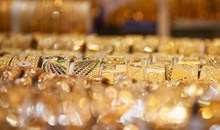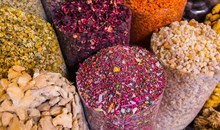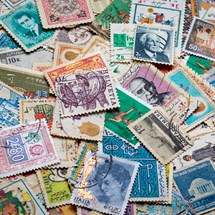Sharjah
Copyright: zohaib anjum/Shutterstock.comSharjah
Sharjah, often overshadowed by its glitzy neighbour Dubai, is a hidden gem rich in culture and history. Named the Capital of Islamic Culture in 2014, Sharjah boasts a vibrant Heritage Area filled with historic sites and museums. The Emirate's contemporary scene shines through with events like the Sharjah Biennial and attractions such as the acclaimed Rain Room. This blend of the old and new makes Sharjah a unique destination for travellers seeking a deeper cultural experience in the UAE.The Emirate
The Emirate of Sharjah has received worldwide acclaim as the one that best preserves Emirati culture and traditions, which rings out loudly through the city's Heritage Area packed with sights and museums. The possible downside to such a deep-rooted connection to the past might be the ban on alcohol sale and consumption (allowed for 'alcohol license' holders only, which have to be non-Muslim, locally employed and relatively well-paid). Unlike in other Emirates, drinks cannot be served even at some of the most upscale hotel bars, and modest clothing is required for both men and women. However, Sharjah has managed to embrace modernity while still firmly holding on to its heritage, which makes up for some of its shortcomings on the nightlife front. Unique new cultural centres, such as the Al Noor Island project, are turning Sharjah into an entertainment hub in its own right. The Corniche and waterfront areas come alive after sundown, and the multiple modern shopping centres and traditional souqs offer unlimited shopping opportunities. The Sharjah Emirate is not geographically restricted to the North of Dubai - it reaches the Gulf of Oman on the eastern coast of the UAE via its seaside territories of Dibba Al Hisn, Khor Fakkan and Kalba.Do & See
Tradition meets modernity in Sharjah, where museums and architectural monuments compete for visitors' attention with modern high-tech venues such as Al Noor Island. The Sharjah Heritage Area is where most museums and historic sights are concentrated. Sharjah also boasts a few places where one can get close to nature—marine life is best observed at the local Aquarium, and the Arabian Wildlife Centre allows for close contact with and observation of animals native to the area.
Dining
Modern Emirati cuisine is quite cosmopolitan and contains elements of a whole variety of Middle Eastern and Asian culinary traditions. Dishes traditionally include a grain (rice is most common) and some variety of meat (often chicken or lamb) or seafood (which is abundant). Alcohol is not served anywhere in Sharjah, so meals are normally followed by hot drinks (spiced coffee or tea) or fruit juices.
Cafés
Due to a sizable expat presence in Sharjah, Western-style cafés serving foods like burgers, salads and pizza are not uncommon. There are, however, quite a few traditional establishments that function as evening venues for locals, where coffee, teas, and juices are served instead of alcoholic drinks, and backgammon is played in the outdoor seating areas.
Bars & Nightlife
One will not find much in the way of bars and clubs in Sharjah, since alcohol sale and consumption is banned in all of the Emirate. Most visitors looking for vibrant nightlife head to neighbouring Dubai, where alcohol regulations are much more lax and party venues are aplenty. Evenings in Sharjah are mostly spent at restaurants or outdoor cafés, enjoying a meal accompanied by freshly squeezed juices. One of the most popular after-sundown spots in the city is the Al Majaz Waterfront, where quite a few establishments located right by the water offer unobstructed views of the daily fountain light show in the lagoon.
Shopping
The unmissable shopping venue in Sharjah is the covered Central Souq, also called 'Blue Souq' for the sky-blue colour of its domes. This souq is Sharjah's largest and busiest and sells a variety of items ranging from local handicrafts and rugs to gold and jewellery. There are, however, quite a few modern malls in and around Sharjah. These sell items at a fixed price, and often house entertainment centres and even amusement parks.

 Copyright: Zahid Lilani/Unsplash
Copyright: Zahid Lilani/Unsplash
 Copyright: Raquel Arroyo Arroyo/Pexels
Copyright: Raquel Arroyo Arroyo/Pexels
 Copyright: Philip Lange/Shutterstock.com
Copyright: Philip Lange/Shutterstock.com
 Copyright: janet carr/Shutterstock.com
Copyright: janet carr/Shutterstock.com
 Copyright: David Clode/Unsplash
Copyright: David Clode/Unsplash
 Copyright: Mateusz Gzik/Shutterstock.com
Copyright: Mateusz Gzik/Shutterstock.com
 Copyright: Shreyak Singh/Unsplash
Copyright: Shreyak Singh/Unsplash
 Copyright: Jametlene Reskp/Unsplash
Copyright: Jametlene Reskp/Unsplash
 Copyright: Zoshua Colah/Unsplash
Copyright: Zoshua Colah/Unsplash
 Copyright: Jean-Luc Picard/Unsplash
Copyright: Jean-Luc Picard/Unsplash
 Copyright: Engin_Akyurt/Pixabay
Copyright: Engin_Akyurt/Pixabay
 Copyright: Jonas Dücker/Unsplash
Copyright: Jonas Dücker/Unsplash
 Copyright: Katerina Niuman/Unsplash
Copyright: Katerina Niuman/Unsplash
 Copyright: Pexels/Pixabay
Copyright: Pexels/Pixabay
 Copyright: zeljkodan/Shutterstock.com
Copyright: zeljkodan/Shutterstock.com
 Copyright: Zhukov Oleg/Shutterstock.com
Copyright: Zhukov Oleg/Shutterstock.com
 Copyright: matthiaskost/Pixabay
Copyright: matthiaskost/Pixabay
 Copyright: Bao Menglong/Unsplash
Copyright: Bao Menglong/Unsplash
 Copyright: CHUTTERSNAP/Unsplash
Copyright: CHUTTERSNAP/Unsplash
 Copyright: Reinaldo Kevin/Unsplash
Copyright: Reinaldo Kevin/Unsplash
 Copyright: Maik Winnecke/Unsplash
Copyright: Maik Winnecke/Unsplash
 Copyright: Ali Bakhtiari/Unsplash
Copyright: Ali Bakhtiari/Unsplash
 Copyright: Dima Mukhin/Unsplash
Copyright: Dima Mukhin/Unsplash
 Copyright: Miryam León/Unsplash
Copyright: Miryam León/Unsplash
 Copyright: Hamish Kale/Unsplash
Copyright: Hamish Kale/Unsplash
